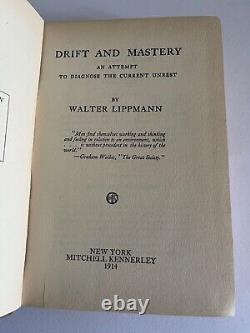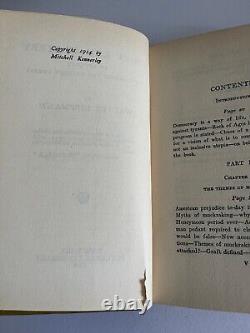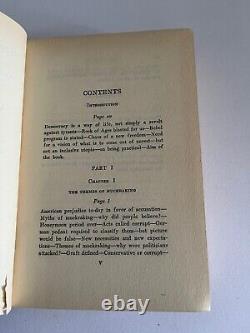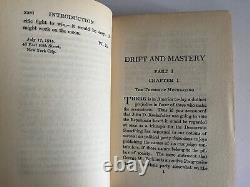WALTER LIPPMANN / Drift and Mastery 1st, 1914, Mitchell Kennerley, SIGNED

















Drift and Mastery: An Attempt to Diagnose the Current Unrest Lippmann, Walter Published by Mitchell Kennerley, New York, 1914. Small publisher ad laid in. Drift and Mastery: An Attempt to Diagnose the Current Unrest is the second book by American journalist and political thinker Walter Lippmann. Published in the Fall of 1914, Drift and Mastery argues that rational scientific governing can overcome forces of societal drift. Lippmann argued that due to the profound social and economic change old ideas and institutions lacked relevance.
Specifically, Drift and Mastery warns against a reliance on broad theories and the framework of competition and self-interest. Democracy and society at large, he argued, was unable to address problems because it was adrift, lacking intentionality and discipline. Lippmann's prescription in Drift and Mastery was deliberate and scientific governing, what he termed mastery.
This forward-looking progressive vision sought a better society through rational, scientific order, while rejecting Marxist, Utopian and traditionalist thinking. Drift and Mastery received enormously positive reviews, establishing Lippmann as an important public intellectual and figure within the progressive movement. Although Lippmann later lost faith in the promise of science and rationality in government, Drift and Mastery was and is regarded as an important document of the progressive movement. " "Walter Lippmann (September 23, 1889 - December 14, 1974) was an American writer, reporter, and political commentator.With a career spanning 60 years, he is famous for being among the first to introduce the concept of the Cold War, coining the term "stereotype" in the modern psychological meaning, as well as critiquing media and democracy in his newspaper column and several books, most notably his 1922 Public Opinion. Lippmann also played a notable role as research director of Woodrow Wilson's post-World War I board of inquiry. His views on the role of journalism in a democracy were contrasted with the contemporaneous writings of John Dewey in what has been retrospectively named the Lippmann-Dewey debate. Lippmann won two Pulitzer Prizes, one for his syndicated newspaper column "Today and Tomorrow" and one for his 1961 interview of Nikita Khrushchev.

